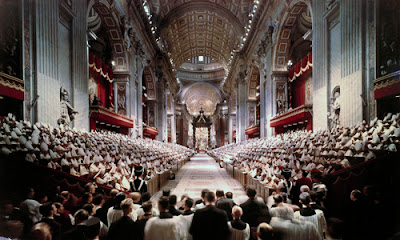THE COUNCIL BEGINS
The following is an excerpt from an author giving an account
of the Council’s grand opening ceremony in Rome: Pope John was 81 years of age
when, on a marvellous October morning in 1962, he was carried on his sedia
gestatoria into St Peter’s. His face was wet with tears. Never had the papacy
been so high in public esteem. If all popes were like him, it was said,
everyone would be lining up to be a Catholic. He personified the phrase of
Horace, ‘Nothing prevents one from telling the truth with a smile on one’s
face.’ The Council showed that even a pope was prepared to listen and learn.
In his opening address, he made it plain that the Church was
not to heed the prophets of doom. The Church had to update herself radically,
and without fear. The cold war of the churches, as far as Rome was concerned
was over. There were to be no anathemas; instead, a return to the Gospel of the
Master, Jesus Christ. The presence of non-Catholic observers in the aula was a
sign of the Church’s change of heart.
The historian McBrien says of Pope John. ‘In a period of
less than 5 years he almost single-handedly transformed the Catholic Church
from a clericalistic, monarchical, unecumenical and theologically rigid body to
a community of radical equality in Christ – laity, religious and clergy alike,
open to dialogue and collaboration with other Christian and non-Christian
communities with non-believers, and with the world at large.’
And there’s another beautiful story told of this
ever-so-human pope. It’s a story that you still hear in Rome and that you read
over and over in any writing about this man. It goes, that on the night of
October 11, 1962, the night of the opening of the Second Vatican Council,
something like half a million people gathered in St Peter’s Square below the Pope’s
bedroom window. The crowd chanted and sang. The aim was to bring Pope John to
his window. And on the night of the greatest day of his life, he rewarded their
singing and chanting by appearing at his window. He called out to them,
“Children, I hear your voices,” and then he went on to explain to this mixed
gathering his hopes for the Council. One historian I read says that the event
was very well recorded in the Roman papers the next day and from that moment
the skeptical Romans were totally converted to his Council. When he
finished his explanation of the Council, he said to the crowd. “Now go back
home, and give your little children a kiss – and tell them it’s from Pope
John.” As one commentator put it: “You could almost touch the emotion. The ‘patriarch’
gave and generated love with all his being.”
At the time of its opening session, Pope John was a sick
man, with cancer. He died on 3rd June the following year, as a never-before
worldwide audience prayed and journeyed with him in his final days. He had
become universally loved like no pope before him.
Pope Paul VI
He was succeeded by that most Catholic of popes, Paul VI,
who was totally committed to the vision of his predecessor. For the next three
years he led the Council to its climax and conclusion in December 1965.
To be continued.......
Material compiled by Monsignor Paul Farmer of the Auckland
Diocese



No comments:
Post a Comment